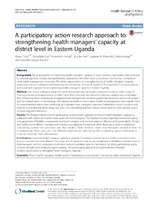A participatory action research approach to strengthening health managers’ capacity at district level in Eastern Uganda

View/
Date
2017Author
Tetui, Moses
Coe, Anna-Britt
Hurtig, Anna-Karin
Bennett, Sara
Kiwanuka, Suzanne Namusoke
George, Asha S.
Kiracho, Elizabeth Ekirapa
Metadata
Show full item recordAbstract
BACKGROUND: Many approaches to improving health managers’ capacity in poor countries, particularly those pursued
by external agencies, employ non-participatory approaches and often seek to circumvent (rather than strengthen)
weak public management structures. This limits opportunities for strengthening local health managers’ capacity,
improving resource utilisation and enhancing service delivery. This study explored the contribution of a participatory
action research approach to strengthening health managers’ capacity in Eastern Uganda.
METHODS: This was a qualitative study that used open-ended key informant interviews, combined with review of
meeting minutes and observations to collect data. Both inductive and deductive thematic analysis was undertaken.
The Competing Values Framework of organisational management functions guided the deductive process of analysis
and the interpretation of the findings. The framework builds on four earlier models of management and regards them
as complementary rather than conflicting, and identifies four managers’ capacities (collaborate, create, compete and
control) by categorising them along two axes, one contrasting flexibility versus control and the other internal versus
external organisational focus.
RESULTS: The findings indicate that the participatory action research approach enhanced health managers’ capacity to
collaborate with others, be creative, attain goals and review progress. The enablers included expanded interaction spaces,
encouragement of flexibility, empowerment of local managers, and the promotion of reflection and accountability. Tension
and conflict across different management functions was apparent; for example, while there was a need to collaborate,
maintaining control over processes was also needed. These tensions meant that managers needed to learn to
simultaneously draw upon and use different capacities as reflected by the Competing Values Framework in
order to maximise their effectiveness.
CONCLUSIONS: Improved health manager capacity is essential if sustained improvements in health outcomes in lowincome
countries are to be attained. The expansion of interaction spaces, encouragement of flexibility, empowerment of
local managers, and the promotion of reflection and accountability were the key means by which participatory action
research strengthened health managers’ capacity. The participatory approach to implementation therefore
created opportunities to strengthen health managers’ capacity.
